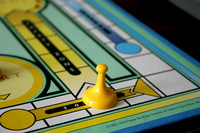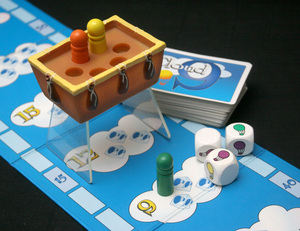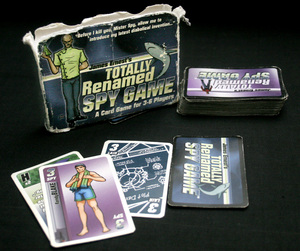A look at board games that don't need to apologize for their faults
Hello and welcome to the new board and card game review column for AnnArbor.com, Critical Hits. I plan to spend my first few columns discussing some mediocre games that most people have played and suggest some alternative games that are similar yet more fun. Let’s start with the game whose very title is an apology for how mediocre it is: Sorry.

Mike Hulsebus | Contributor
To be fair, Sorry is a very well designed game for what it is. For those who don’t remember, players move their four pawns around the board by flipping over cards from a deck with numbers on them showing how many spaces they get to move. If a player flips over a “Sorry” card, he may take a pawn from his start location and knock an opponent’s piece all the way back to that opponent’s start position.
The beauty of the game is that many games end up very close due to a “rubber banding” mechanic that helps even out the field. If a player is doing so well that all his pawns have left their home position, a Sorry card is worthless to him. But, to a player that is running behind, a Sorry card can bring him back into contention and hinder the leading player’s progress. Games end up very close, with the winner usually only winning by a few spaces.
But here’s the problem with Sorry: the game could run itself. I, as a player, don’t have to make any decisions. Sure, I get to choose which piece I am going to knock back to start with a Sorry card, but ultimately, anyone would make the same “decision” as me 100 percent of the time. My apologies, board game Calvinists, but when I play a game, I want more than just the illusion of free will. Sorry is a good game for playing with your children, but it’s not the kind of game I want to pick up and play regularly.
Allow me to suggest two easy-to-learn games that present the player with interesting choices and risks.

Mike Hulsebus | Contributor
Cloud 9 by Out of the Box Games is a game I’ve owned for a few years that still sees regular play. It plays two to six players and games take about 30 minutes to complete. Players receive a hand of cards in four different colors. When it is the player’s turn to pilot the balloon, he begins by rolling two dice that will show what colors of cards he must play in order for the balloon to climb. Other players in the balloon then decide whether they want to stay in the balloon because they think that the pilot has the cards, or whether they want to get out before the pilot crashes the balloon by not having them. If the pilot has those colors, he must play them, and the balloon rises to higher point values. If he isn’t able to play the cards, only the players that got out of the balloon score points; the rest get nothing.
This presents the player with a few different interesting decisions. He can opt to try and score regular, safe points a few at a time, or — especially if he is falling behind — he can try to go for broke and ride the balloon to the top and score maximum points. The higher the balloon rises, more difficult the dice rolls become, so the player has to figure out how much risk he is willing to take on.
While this game has lots of great choices, there isn’t necessarily a lot of skill involved. Observant players can better figure out the odds of someone having certain cards — “Hmm, she didn’t have purple last time, but I do I want to risk that maybe she has purple this time?” — rewarding people for paying attention but not requiring it.
Perhaps my favorite moment of Cloud 9 is the end. If two players reach the 50-point goal simultaneously, whoever ends that balloon trip with the most points wins. So one player could get out of the balloon, locking in that she’ll end the round with enough points to win, but the remaining players in the balloon will get to finish the balloon trip, making a last ditch do-or-die effort to surpass her score before the balloon drops. So like Sorry, games come down to the wire, but in a “every decision counts” kind of way rather than a “who is randomly going to win” kind of way.

Mike Hulsebus | Contributor
A card game with slightly more strategy to it — and perhaps my favorite card game — is James Ernest’s Totally Renamed Spy Game (previously titled Before I Kill You, Mr. Bond before they were forced to rename it). On first glance, you may make a few comparisons to War, but Spy Game is to War what major league baseball is to hitting rocks with a stick alone. Spy Game says it plays three to six players, but it plays with two players just fine (though it has a different feel and strategy with two).
Players play cards in front of them face down to form their evil mad scientist lair and earn points by capturing spies in their lair. The turn rules are pretty simple:
1) Draw two cards2) Play a lair card face down to add to your lair if you want
3) Play a spy from anywhere to anywhere if you want
When a spy gets played on a lair, all of that lair’s cards are turned face up. If the spy value is greater than the lair, the lair is destroyed. If not, the spy is captured and that lair’s owner scores points equal to the spy’s value.
But — and here’s one of the interesting parts — the person who captured the spy has the option of doubling the spy’s value as many times as he wants to attempt. The deck contains a set of cards lettered A-I, four of each. If a player plays an letter card, and no other player responds by playing a matching letter, the points are doubled. Otherwise the spy escapes and destroys the entire lair in the process. Players don’t have to play letter cards if they have them though: in fact once you let one letter card go by, maybe you want save its match to double your own spy. This aspect of the game definitely can reward players that can remember which letter cards have already been played, but memory alone won’t win the game for you.
The most innovative part of this game is that all spy cards have purple backs while lair and letter cards have blue backs. So you can immediately look at the back of someone’s hand and get a feel for how many spies he or she has and base your strategy on that. Did they play a lair and not try to score a spy? Perhaps that spy in their hand is big enough to destroy their lair. So you can use the “play a spy from anywhere to anywhere” part of your turn to take the spy from their own hand and play it on themselves.
And like Cloud 9, if one player gets ahead and is nearing the points needed for victory, opponents can try and some daring last-minute doubles that, while unlikely, keeps the game interesting and contested to the very end.
So if you’re looking to pick up some easy-to-understand games that allow you to play and make decisions, I’d recommend these two games. To those unfamiliar with the world of unconventional games, you’re not going to find these in a Wal-Mart. Amazon carries a great deal of board games and has free shipping for orders over $25 and for those looking to shop locally, Get Your Game On (here in town at Packard and State) has a great selection and can do special orders on any games they don’t have in stock.
Join me on Friday when we look at more fun alternatives to games you are tired of, starting with Trivial Pursuit, the least exciting party game I know. In the meantime, I’d love to hear your thoughts in the comments. What are some games you love that are simple yet still engaging after multiple plays?
Mike Hulsebus is an Ann Arbor resident who, despite his qualms with it, still plays Sorry from time to time. If you found him simple yet engaging or had any other comments, he can be reached at mikehulsebus@gmail.com.


Comments
J. Sorensen
Fri, Mar 19, 2010 : 4:39 a.m.
I think my favorite "Monopoly" was the "make your own-Monopoly kit" that came out a few yrs. ago. With a software disk, you create and print out the labels for the board. You decide all the players and properties. We named ours after the street we grew up on and had all the old neighbors as players, and our favorite landmarks as properties (including Vets park, A&W, etc...). Nothing like a totally personalized version of the game.
Mike Hulsebus
Thu, Mar 18, 2010 : 9:24 p.m.
Stefan, yeah, there are crazy amounts of Monopolies out there. I'm told that the WWII museum in Caen sells Monopoly: Caen. I'm not sure why someone would want to buy a war-themed game when he or she could instead by an actual war game. I hear Memoir 44 is good. A quick search also tells me that there is a Dog Artist Monopoly (?) and a Sephora Monopoly. Why would you want play Monopoly based on costly makeup? Who approves these games?
Stefan Szumko
Thu, Mar 18, 2010 : 8:38 p.m.
A double yay for new games to play. Once I played "Settlers of Catan" while living in Germany, I turned by back on the the mainstream US game industry. How many versions of Monopoly does one need to own? Does adding sound effects or video to an old game really make it new and more challenging? Thanks for getting the word out.
Brian
Thu, Mar 18, 2010 : 5:02 p.m.
I love Cloud 9 and recommend it to anyone. Great article Mike, keep them coming :)
Mike Hulsebus
Thu, Mar 18, 2010 : 5:01 p.m.
@Bridget I don't have kids myself, but I one resource you might try is The Dice Tower, a video review site. Tom reviews both nerdy games and kids' games, so if there's a game you're interested in. You can find him and one of his daughter's top games here: http://www.thedicetower.com/thedicetower/index.php/top_100 I watch his kids reviews out of interest and Haba seems to make some pretty cool little games. @Tidge So Treehouse is pretty good? I've seen pictures of it and I worry it it too much like my all time least favorite game, LCR. But it has to be different than that, right? I like Bang, Bang is fun. In some weeks to follow I'm going to take a look at Battlestar Galactica, a board game you might like if you like Bang. Thanks for all the comments everyone!
Sarah Rigg
Thu, Mar 18, 2010 : 3:09 p.m.
Mille Bornes! favorite family game growing up, and now I play with my husband... http://en.wikipedia.org/wiki/Mille_Bornes
tidge
Thu, Mar 18, 2010 : 2:53 p.m.
May I recommend the following: BANG!: It is a wild-west themed card game that is good for an odd number of players (3-6, or more) Kill Doctor Lucky: (Also from the makers of "Before I Kill You.../renamed spy game") is essentially a quest to answer the question "Did you ever wonder what happened *before* Clue(TM)?" best with 3+ players. Treehouse: A fast and simple dice rolling/pyramid game from Looney Labs. Good for 2-4 players, easy for all ages.
Keats
Thu, Mar 18, 2010 : 12:02 p.m.
I love this and look forward to more. One of our favorite party games is Zombies!!!, always fun and usually close at the end.
Bridget Bly
Thu, Mar 18, 2010 : 10:42 a.m.
What a great column. I have to say that we play Sorry a lot as a family. For us (at the moment) the fact that skill doesn't necessarily determine who wins is a good thing. Kids of different ages can play it and the older kid doesn't always win. That being said, I'm definitely going to try Cloud 9. We like Harry Potter Clue, because the Harry Potter fans in the family can play it just be in the Hogwarts world, while the competitive ones can play to win. We also like Labyrinth, which has a challenging spatial-reasoning aspect. That makes a nice change from money-collection games like Monopoly and Life (the old version is better, of course). Maybe you could write a column on family game-playing issues? Like when it is appropriate for grownups to put their thumb on the scale, so to speak, so a younger child doesn't *always* lose? (My younger brother will not play Hearts to this day because my older sister and I beat him so mercilessly when we were all children.) It's helpful to know what games make mercy possible (if you should want to go down that path) and which don't. I can play Stratego with my youngest, however, and if I choose a risky enough set-up, I will not necessarily win, even though I play my best from that point on.
JAM
Thu, Mar 18, 2010 : 8:01 a.m.
Ah! Where were you before Christmas when I was shopping for my nephews :) I finally wound up with "Apples to Apples," which a friend introduced me to... unfortunately, they already have it! If you can still find it, you should try "Pig Mania"... even adults who think games are stupid are yelling "ROLL THE PIGS! ROLL THE PIGS!" 5 minutes into it!
erikko
Thu, Mar 18, 2010 : 7:26 a.m.
It's good to see alternative board and card games getting some attention. I've been introducing friends and coworkers to little-known games for years. They claimed they didn't like board games, but they leave very satisfied, and they come back for more. There are many high quality games if you're willing to try them out.